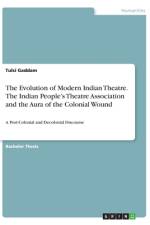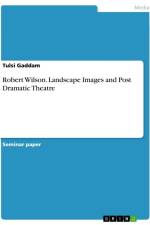von Tulsi Gaddam
15,95 €
Seminar paper from the year 2018 in the subject Art - Installation / Action/Performance Art / Modern Art, grade: 8/10, University of Groningen (Arts), course: Arts, Culture and Media, language: English, abstract: In this essay, Grotowki¿s interest in the Avantgarde concept of primitivism in relation to the spiritual healing of the community will be explored through three phases in his work. Poor Theatre, Paratheatre and Theatre of Sources. In addition, an exploration of the phases in Grotowski¿s theories, the evolution of Grotowski¿s performance theories will be analyzed in the context of communal healing of the spirit through ritual and use of primordial forms of theatre. This essay applies an Anthropological approach to Grotowski and his use of ritual as it concerns itself with the relationship between society, theatre and the ideas conceived by the two. This essay explores Grotowski's preoccupation with the Neo-Avantgarde notion of returning to the ¿roots of theatre¿ explored through the phases of Poor Theatre, Paratheatre and Theatre of Sources in order advocate for the ¿spiritual healing¿ of the community. The Avantgarde is an artistic movement which followed Modernism, and can be considered an early phase of Post-Modernism. The Avantgarde can be split into two phases: The Historical Avantgarde, which began prior to World War II, and the Neo-Avant garde, which followed it. The Neo-Avantgarde can be classified as a period of experimentation between the 1950s and 1960s by practitioners such as Jerzy Grotowskiand Richard Schechner. Avant-garde Theatre, defines the ideology as a "philosophical grouping¿linked by a specific attitude to western society, a particular aesthetic approach, and the aim of transforming the nature of theatrical performance" (Innes 4). The defining aspects of the Neo-Avantgarde are the interconnections in ideologies of the practitioners that dominated the movement and the rejection of western conventions and beliefs. This is explored through the actors physical presence, spectator-performer dynamics, the links between theatre and ritual, catharsis and the aspiration to reconnect theatre and life. The underlying concept connecting the aforementioned aspects is that of primitivism, which will be discussed in this essay in the context of Jerzy Grotowski.



